Search
Did you mean: The Dagda?
Search Results
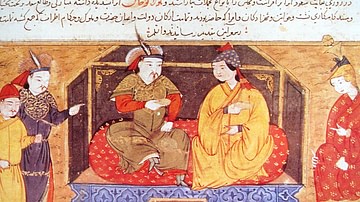
Definition
Ilkhanate
The Ilkhanate (or Ilqanate, 1260-1335 CE) was that part of the Mongol Empire (1206-1368 CE) which mostly covered what is today Iran and parts of Turkmenistan, Turkey, Iraq, Armenia, Afghanistan, and Pakistan. Established by the Mongol general...

Image
The Silk Road at Its Height in the Late 8th Century
This map illustrates the Silk Road in the late 8th century, a vast network connecting Tang China, Central Asia, the Islamic world, and Europe. More than just a silk route, it enabled the exchange of luxury goods, technologies, and religions...
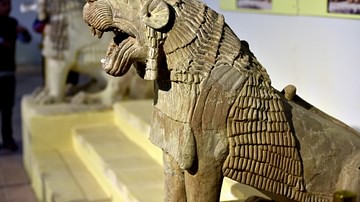
Image
A Pair of Lions from Tell Harmal at the Iraq Museum
Two terracotta lions found at the entrance to the Dagan Temple at Tell Harmal (ancient Shaduppum), in the eastern outskirt of Baghdad, Old Babylonian period, c. 1800 BCE. The temple was a typical Old-Babylonian one, with a short staircase...
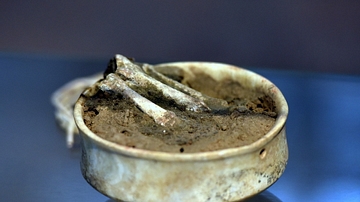
Image
Bowl with Bones from Tell es-Sawwan
This pottery bowl contains earth and some bones of a human being and found at Tell es-Sawwan. Tell es-Sawwan is an ancient archaeological site in Saladin Province (about 110 Km north of Baghdad) and is associated with the Samarra culture...
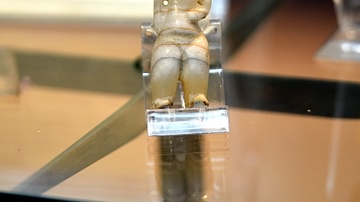
Image
Figurine from Tell es-Sawwan
This small marble figurine was found at Tell es-Sawwan. Probably, it represents a mother goddess. The eyes are inlaid with shells set in bitumen. Tell es-Sawwan is an ancient archaeological site in Saladin Province (about 110 Km north of...
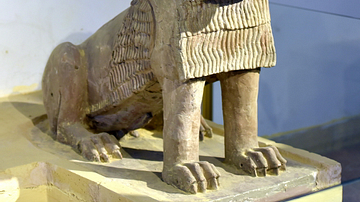
Image
Terracotta Lion from Tell Harmal
This terracotta lion was found at the entrance to the Dagan Temple at Tell Harmal (ancient Shaduppum), in the eastern outskirt of Baghdad. The temple was dedicated to Nisaba (goddess of the grain and writing) and her consort, Haja. The...
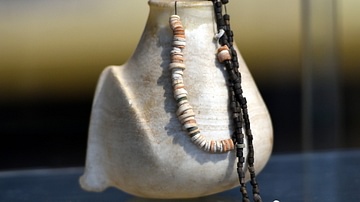
Image
Small Jar from Tell es-Sawwan
Small marble jar which was found at Tell es-Sawwan, Iraq. Tell es-Sawwan is an ancient archaeological site in Saladin Province (about 110 Km north of Baghdad) and is associated with the Samarra culture. 6000-5800 BCE. On display at the Iraq...
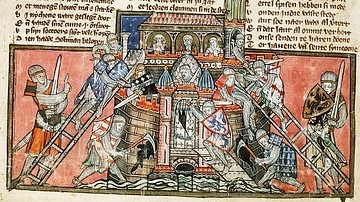
Article
The Siege of Antioch, 1097-98 CE
The siege of Antioch in 1097-1098 CE occurred during the First Crusade (1095-1102 CE) when the western Crusader knights were on their way to retake Jerusalem. The great metropolis of Antioch in northern Syria was heavily fortified, and it...
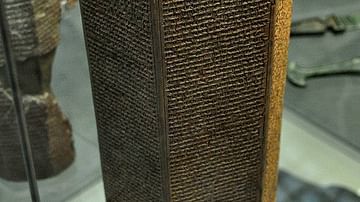
Image
The Taylor Prism of King Sennacherib, Nineveh
This prism records the first eight campaigns of the Assyrian King Sennacherib (704-681 BCE). This six-sided baked clay document (or prism) was discovered at the Assyrian capital Nineveh, in an area known today as Nebi Yunus. It was acquired...
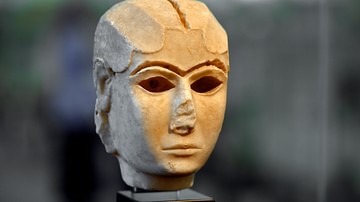
Image
The Mask of Warka
The mask of Warka, the first almost complete and life-size depiction of the human face in history, with respect to its anatomical details. It is made of marble and is about 20 cm tall. The eyes may have been inlaid with shells and lapis lazuli...